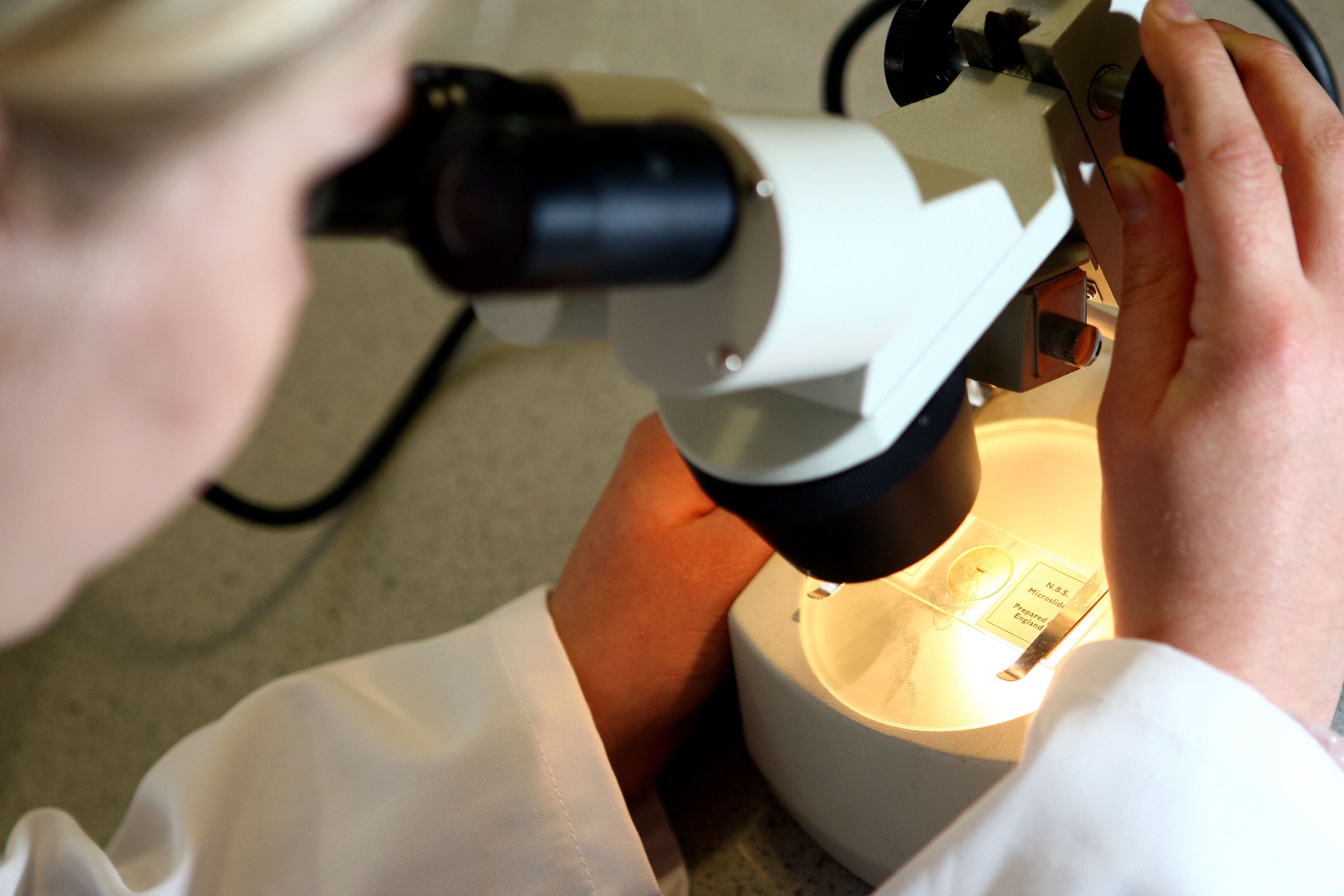Why the standard test for prostate cancer often misses the most dangerous types
President Biden, 82, has been diagnosed with advanced, incurable prostate cancer. But how could a disease like this go undetected in one of the most medically monitored men in the world? Leah Hardy explains why current tests are notorious for false negatives – and why the new ones on the horizon could change everything...

In early 2024, President Biden’s White House doctor described him as a “healthy, active, robust 81-year-old male”. Just a year later, he has been diagnosed with aggressive prostate cancer that has already spread to his bones – making it incurable.
The speed and severity of the disease have stunned many, prompting widespread speculation since the announcement yesterday. While president Donald Trump sent his “warmest and best wishes” to Biden, Barack Obama paid tribute, and former vice-president Kamala Harris called him a “fighter”, Donald Trump Jr was quick to question whether Dr Jill Biden had helped “cover up” her husband’s health scare, and Maga activist Laura Loomer alleged the announcement was a “PR strategy” to distract from a forthcoming book detailing his declining health during his final year in office.
At first glance, it is a baffling situation. The cancer was apparently discovered only after Biden reported urinary symptoms last Friday. A scan revealed a small nodule on his prostate, and further investigation showed the disease had already metastasised – to his bones. However, it’s also true that a diagnosis like this isn’t unusual for a man of Biden’s age. Prostate cancer is the most commonly diagnosed cancer in men in the UK. Around 12,000 men die from it each year – roughly 33 every day.
“Prostate cancer is extremely common,” says Dr Alastair Lamb, a clinician scientist and prostate cancer researcher at the Barts Cancer Institute. “Half of men who live to be over 80 will have cancer in their prostate.” Older men and Black men are also more likely to develop aggressive or late-stage disease – something experts link to a lack of effective screening.
It’s also the case that the standard PSA (prostate-specific antigen) blood test can – and often does – miss deadly cancers, even in someone like a former president, who would have access to the best healthcare in the world. The PSA test looks for an enzyme made in the prostate, and the assumption would be that the former president had regular PSA tests, which should have picked up signs of the disease long ago. But that’s not necessarily the case.
PSA tests are notoriously unreliable. According to Cancer Research UK, around 15 per cent of men with a normal PSA level actually have prostate cancer, while 80 per cent of those with a high PSA do not. Even more worryingly, Dr Lamb explains, the test often fails to detect cancers that could shorten a man’s life. “PSA testing flags up too many prostate cancers which will never cause any harm,” says Dr Lamb. “But it can fail to identify the most dangerous types.”
Around 3 per cent of men with prostate cancer have aggressive forms that spread quickly and can be fatal. Biden’s cancer falls into this rare but serious category.

In the US, prostate cancers are graded using the Gleason score, which ranges from six to 10, based on how abnormal the cancer cells look under a microscope. The higher the number, the more aggressive the cancer. Biden’s score was 9 – classifying it as high-grade and fast-growing. Paradoxically, these dangerous tumours may be the ones most likely to be missed by a PSA test.
What does the PSA test really measure?
The PSA enzyme helps semen stay fluid and is naturally present in the bloodstream. Many benign factors – such as age, infection, or an enlarged prostate – can raise PSA levels. However, aggressive prostate cancer cells don’t always produce more PSA than healthy ones. In fact, they may produce less.
The structure of cancer cells allows more PSA to leak into the bloodstream – hence the utility of the PSA test – but high-grade cancers sometimes don’t produce PSA at all. A 2023 report from the US National Library of Medicine states: “Very high Gleason score cancer cells … may not produce PSA”. In these cases, PSA levels remain normal, lulling patients and doctors into a false sense of security. This, says Dr Lamb, not only makes such cancers harder to detect, but also harder to treat. Low-PSA tumours may resist hormone therapy – the standard treatment used to slow the spread of advanced disease.

The race for a better test
Because of these shortcomings, researchers are urgently working on more accurate ways to screen for prostate cancer. One promising approach is a saliva test developed by a team at the Institute of Cancer Research (ICR) in London. It identifies more than 160 genetic variants linked to prostate cancer and uses AI to calculate a man’s personal risk.
In trials, the saliva test outperformed the PSA test – detecting more cancers, especially aggressive ones, and producing fewer false positives. It even identified tumours missed by MRI scans. Among high-risk men sent for MRI and biopsy, 40 per cent were diagnosed with cancer, compared to 25 per cent of those identified by PSA alone.
“This test could turn the tide on prostate cancer,” says Professor Ros Eeles of the ICR.
The test isn’t yet available on the NHS. Early trials focused mostly on men of European descent, even though Black men are twice as likely to develop prostate cancer and more than twice as likely to die from it – likely due to genetic differences. The test has since been expanded to include variants affecting African and Asian men, and further trials are underway. Those identified as high-risk are being monitored closely, much like women with the BRCA gene linked to breast cancer.
At the same time, Prostate Cancer UK is investing £42m in a major study called the Transform trial, which will follow hundreds of thousands of men. The study will compare screening tools – including PSA, genetic, and imaging tests – to find the most effective way to detect prostate cancer early. Initial results are expected in three years.
“A test that helps us better select men at greater risk is very exciting,” says Dr Lamb. “But it could still be a decade before we know if it truly saves lives.”
Dr Lamb’s own work focuses on the genetic fingerprint of prostate tumours. His team is working on ways to distinguish between cancers that are likely to be harmless and those that could be deadly – using blood tests or MRI scans.
Meanwhile, biotech entrepreneur Professor Sir Chris Evans has announced a new AI-powered blood test he calls a “super test” for prostate cancer. Developed by his diagnostics company, EDX Medical, it uses algorithms to identify early- and late-stage cancer, determine its aggressiveness, assess genetic risk, and guide treatment options.
“The increased accuracy over PSA testing should reduce the need for unnecessary MRIs,” says Prof Evans. “And it could also dramatically reduce the need for invasive rectal exams.”
The test has been patented and is currently undergoing further trials, with a launch expected later this year or in early 2026.
Despite the shared diagnosis, not all prostate cancers are equal. “On paper, every man with prostate cancer has the same disease,” says Dr Lamb. “But in reality, it doesn’t feel like that.” Some tumours remain dormant; others are lethal. The challenge, he says, is finding a test that can catch the deadly ones before it’s too late. “That’s what keeps us up at night.”
Should you have a PSA test?
Routine PSA screening is not currently offered on the NHS, but your GP may recommend it if you have symptoms such as:
- Frequent urination or sudden urgency
- Getting up multiple times at night to urinate
- Blood in your urine
- Difficulty getting or maintaining an erection
Men aged 50 or over can request a PSA test from their GP even without symptoms.
You’re at higher risk if you:
- Are over 50
- Have a close male relative (father or brother) with prostate cancer
- Are of Black ethnic background
Talk to your GP about the risks and benefits of PSA testing.



Join our commenting forum
Join thought-provoking conversations, follow other Independent readers and see their replies
Comments